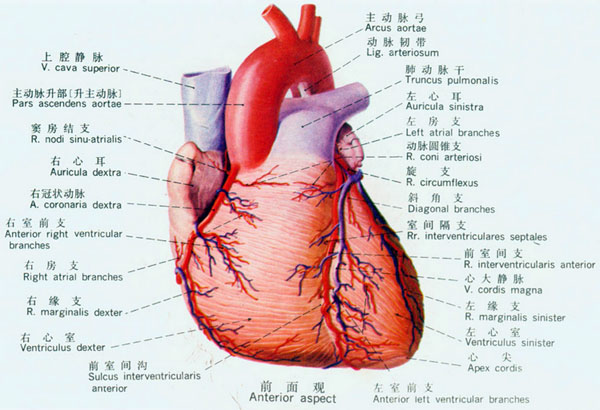Govern Blood
The function of the heart to govern blood means that the heart propels blood to circulate in the vessels and that the heart is related to the production of blood. Blood circulates inside the vessels. Since the heart is connected directly with the vessels, its beat is the motive power to propel blood to flow in the vessels. Thus a relatively independent blood circulation system is formed with the heart, the vessels and blood. Only under the propelling of the heart beat and the control of the vessels can blood normally circulate all through the body, in which the heart beat is key to blood circulation.
The reason that the heart propels blood to circulate within the vessels lies in the propelling and warming functions of heart-qi and heart-yang as well as the nourishing and moistening functions of heart-yin and heart-blood. Sufficiency of heart-qi, heart-blood, heart-yin and heart-yang guarantee normal beat of the heart and continuous circulation of blood to nourish all parts of the body, thus maintaining the normal physiological functions of all tissues and organs with the manifestations of full vitality, ruddy complexion and normal pulse.

However,if heart-qi, heart-blood, heart-yin and heart-yang are insufficient or in disturbance, the function of the heart to govern the vessels will be affected, leading to a series of pathological changes such as pale complexion and thin and weak pulse due to insufficiency of heart-qi as well as cyanotic complexion and unsmooth pulse or slow pulse with irregular intervals or slow regular intermittent pulse due to stagnation of heart-blood.
The heart also plays a role in the production of blood, known as "reddening" in TCM. After digestion and absorption of food by the spleen and stomach, the refined nutrients are transported up to the heart and the lung. Combined with the fresh air inhaled into the lung, warmed and steamed by heart-yang, these refined nutrients are transformed into red blood.
Besides, TCM believes that "the heart controls blood vessels", a combination of the ideas that "the heart governs blood" and "the heart controls the vessels". The idea that "the heart controls blood and vessels" is described in the section of "the relationship between the heart and the body, the sensory organs and the orifices."
Control the Mind
The function of the heart to control the mind is also known as "the heart storing spirit". In a broad sense, spirit refers to the supreme dominator of life activities in the whole body. In a narrow sense, spirit is a collective term for cognition, thinking, consciousness and mental states. The idea that the heart controls the mind means that the heart governs the mental activities.
The mental activities are closely related to the response of the brain to the external environment and certain intrinsic functions of the brain. Centering around the five zang-organs, TCM attributes the motivation of mental activities to the heart. It is obviously that the conception of the heart in TCM includes certain functions of the brain.
The normal function of the heart to control the mind depends on the nourishing and moistening functions of heart blood and heart-yin which are the essential substantial bases for mental activities. Heart-qi and heart-yang function to activate and stimulate heart-spirit, which also plays an important role in ensuring the normal function of the heart to control the mind. If the function of the heart to control the mind is normal, people will be full of vigor, conscious in mind, agile in thinking and keen in response. If the function of the heart to control the mind is abnormal due to insufficiency or disturbance of heart-qi, heart-blood, heart-yin and heart-Fang, it will inevitably lead to palpitation, insomnia, dreaminess, or even coma, delirium and unconsciousness.







